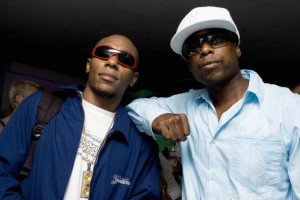Entering the Sugar Mill’s main hall, I’m struck by Corey Glover, Corey Henry, and the full power of “Cult of Personality,” more relevant and infectious than ever. The room is packed, and I marvel at the turnout for a Black Star reunion. Perhaps this is more about the career of Galactic than the moment that was/is Mos Def (a.k.a. Yasiin Bey) and Talib Kweli’s collaboration? Hard to know what fraternities listen to these days.
In a way, Mos Def & Talib Kweli Are Black Star marked the end of an era in the New York underground. Both MCs claimed Native Tongues membership and the album echoed influences of A Tribe Called Quest, Ultramagnetic MCs, Gang Starr and other heady, jazz-tinged groups that made the ’80s and ’90s a golden age for “consciousness.” Though gifted lyricists, neither man quite outdid their joint premiere, a lush, often humorous, somewhat arch album that reacted to both the deaths of Tupac and Biggie, and the excesses that surrounded corporately sanctioned rap music.
After putting out the first Company Flow record, Rawkus Records released Black Star in 1998, as well as important subsequent works by Big L, Mos’ solo effort and Pharoah Monche’s seminal Internal Affairs. (Legend says the hit single “Simon Says” off that last album broke the label’s back.) By the time it came crashing down, the excesses decried by Black Star were dominant and entrenched, so going to see Black Star is sort of a big deal for hip-hop fans of a certain age and bent. Unfortunately, we had sound issues. Serious sound issues.
A day after MCA’s untimely death, the duo emerges to “No Sleep Til Brooklyn.” When the album’s single “Definition” comes out muddy with mics cutting in and out, I get worried. Bey does “N***s in Poorest,” his take on the Kanye/Jay-Z hit, I think about the recent article in The Atlantic (dig the props for New Orleans in there) on those torchbearers of corporate rap. On their “Watch the Throne Tour,” Ye and Jigga closed out each show with the song, doing it as an encore up to nine times in a row. Now here we are watching the respected opposites of that entire operation struggle to be heard.
On the positive side, neither man gives up. They remain warmly respectful of each other, visibly admiring the other’s flow as they take turns. When one does a solo cut, as Talib did for “Get By” and Yasiin did on “Casa Bey,” the other is right there on the choruses, hyping and nodding. Good to remember that these are true hip-hop heads, artists who grew up in the shadows of Kool G Rap, Slick Rick and Rakim. Much of their original partnership celebrated that history, a torch each carries in different directions today. Tonight, the bond is strong.
They dedicate “Brown Skin Lady” to Whitney Houston and Gil Scott-Heron. I move to the side of the stage for “Respiration,” the cut that’s always stayed with me as an actualization of the whole “urban poetry” dream and that sounds fairly clear from that position. Technical issues persist, though, and the set ends strangely with a long, guitar-laden instrumental (the rapport with the DJ was strained throughout). Bey dances earnestly and reminds me of seeing him on Broadway in Topdog/Underdog; Talib was never the dancing type.
Then it’s over. Just like the ’90s, the show ends abruptly, with some of us wishing we could get a little more Black Star amid the noise. I saw Mos Def perform in Philadelphia in 2001. When I came out, my bike tires were missing. Perhaps it’s me.





